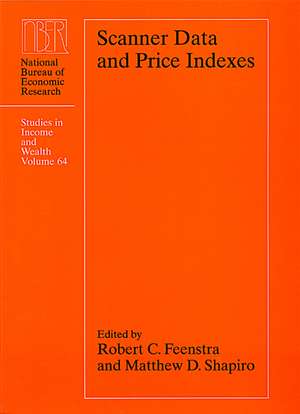Scanner Data and Price Indexes: National Bureau of Economic Research Studies in Income and Wealth, cartea 64
Editat de Robert C. Feenstra, Matthew D. Shapiroen Limba Engleză Hardback – feb 2002
Every time you buy a can of tuna or a new television, its bar code is scanned to record its price and other information. These "scanner data" offer a number of attractive features for economists and statisticians, because they are collected continuously, are available quickly, and record prices for all items sold, not just a statistical sample. But scanner data also present a number of difficulties for current statistical systems.
Scanner Data and Price Indexes assesses both the promise and the challenges of using scanner data to produce economic statistics. Three papers present the results of work in progress at statistical agencies in the U.S., United Kingdom, and Canada, including a project at the U.S. Bureau of Labor Statistics to investigate the feasibility of incorporating scanner data into the monthly Consumer Price Index. Other papers demonstrate the enormous potential of using scanner data to test economic theories and estimate the parameters of economic models, and provide solutions for some of the problems that arise when using scanner data, such as dealing with missing data.
Scanner Data and Price Indexes assesses both the promise and the challenges of using scanner data to produce economic statistics. Three papers present the results of work in progress at statistical agencies in the U.S., United Kingdom, and Canada, including a project at the U.S. Bureau of Labor Statistics to investigate the feasibility of incorporating scanner data into the monthly Consumer Price Index. Other papers demonstrate the enormous potential of using scanner data to test economic theories and estimate the parameters of economic models, and provide solutions for some of the problems that arise when using scanner data, such as dealing with missing data.
Preț: 612.61 lei
Preț vechi: 665.88 lei
-8%
Puncte Express: 919
Preț estimativ în valută:
108.36€ • 128.48$ • 94.40£
108.36€ • 128.48$ • 94.40£
Carte disponibilă
Livrare economică 04-18 martie
Livrare express 17-21 februarie pentru 41.11 lei
Specificații
ISBN-13: 9780226239651
ISBN-10: 0226239659
Pagini: 368
Ilustrații: 73 tables, 34 figures
Dimensiuni: 152 x 229 x 38 mm
Greutate: 0.68 kg
Ediția:1
Editura: University of Chicago Press
Colecția University of Chicago Press
Seria National Bureau of Economic Research Studies in Income and Wealth
ISBN-10: 0226239659
Pagini: 368
Ilustrații: 73 tables, 34 figures
Dimensiuni: 152 x 229 x 38 mm
Greutate: 0.68 kg
Ediția:1
Editura: University of Chicago Press
Colecția University of Chicago Press
Seria National Bureau of Economic Research Studies in Income and Wealth
Notă biografică
Robert C. Feenstra is associate professor of economics at the University of California at Davis and is coeditor of the Journal for International Economics.
Cuprins
Prefatory Note
Introduction - Robert C. Feenstra and Matthew D. Shapiro
I. Scanner Data in Official Statistics: Advancing the State of the Art
1. Using Scanner Data to Improve the Quality of Measurement in the Consumer Price Index
William J. Hawkes and Frank W. Piotrowski
2. Scanner Indexes for the Consumer Price Index
David H. Richardson
3. Price Collection and Quality Assurance of Item Sampling in the Retail Prices Index: How Can Scanner Data Help?
David Fenwick, Adrian Ball, Peter Morgan, and Mick Silver
4. Estimating Price Movements for Consumer Durables Using Electronic Retail Transactions Data
Robin Lowe and Candace Ruscher
Roundtable Discussion - Dennis Fixler, John S. Greenlees, David Fenwick, Robin Lowe, and Mick Silver
II. Aggregation across Time
5. High-Frequency Substitution and the Measurement of Price Indexes
Robert C. Feenstra and Matthew D. Shapiro
Comment: Marshall B. Reinsdorf
6. Using Scanner Data in Consumer Price Indexes: Some Neglected Conceptual Considerations
Jack E. Triplett
III. Using Price Data to Study Market Structure
7. What Can the Price Gap between Branded and Private-Label Products Tell Us about Markups?
Robert Barsky, Mark Bergen, Shantanu Dutta, and Daniel Levy
Comment: Julio Rotemberg
8. The Long Shadow of Patent Expiration: Generic Entry and Rx-to-OTC Switches
Ernst R. Berndt, Margaret K. Kyle, and Davina C. Ling
Comment: Steve Morgan
IV. Measuring Change in Quality and Imputing Missing Observations
9. The Measurement of Quality-Adjusted Price Changes
Mick Silver and Saeed Heravi
10. Hedonic Regressions: A Consumer Theory Approach
Erwin Diewert
11. Price Index Estimation Using Price Imputation for Unsold Items
Ralph Bradley
Comment: Eduardo Ley
Contributors
Author Index
Subject Index
Introduction - Robert C. Feenstra and Matthew D. Shapiro
I. Scanner Data in Official Statistics: Advancing the State of the Art
1. Using Scanner Data to Improve the Quality of Measurement in the Consumer Price Index
William J. Hawkes and Frank W. Piotrowski
2. Scanner Indexes for the Consumer Price Index
David H. Richardson
3. Price Collection and Quality Assurance of Item Sampling in the Retail Prices Index: How Can Scanner Data Help?
David Fenwick, Adrian Ball, Peter Morgan, and Mick Silver
4. Estimating Price Movements for Consumer Durables Using Electronic Retail Transactions Data
Robin Lowe and Candace Ruscher
Roundtable Discussion - Dennis Fixler, John S. Greenlees, David Fenwick, Robin Lowe, and Mick Silver
II. Aggregation across Time
5. High-Frequency Substitution and the Measurement of Price Indexes
Robert C. Feenstra and Matthew D. Shapiro
Comment: Marshall B. Reinsdorf
6. Using Scanner Data in Consumer Price Indexes: Some Neglected Conceptual Considerations
Jack E. Triplett
III. Using Price Data to Study Market Structure
7. What Can the Price Gap between Branded and Private-Label Products Tell Us about Markups?
Robert Barsky, Mark Bergen, Shantanu Dutta, and Daniel Levy
Comment: Julio Rotemberg
8. The Long Shadow of Patent Expiration: Generic Entry and Rx-to-OTC Switches
Ernst R. Berndt, Margaret K. Kyle, and Davina C. Ling
Comment: Steve Morgan
IV. Measuring Change in Quality and Imputing Missing Observations
9. The Measurement of Quality-Adjusted Price Changes
Mick Silver and Saeed Heravi
10. Hedonic Regressions: A Consumer Theory Approach
Erwin Diewert
11. Price Index Estimation Using Price Imputation for Unsold Items
Ralph Bradley
Comment: Eduardo Ley
Contributors
Author Index
Subject Index

























